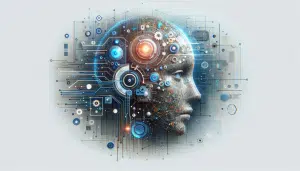How Artificial Intelligence Is Shaping the Future: What You Should Know
Ethan Harris August 15, 2025
Discover how artificial intelligence (AI) is driving change across industries and daily life. This guide explores the latest digital trends, practical applications, and essential considerations to help you understand AI’s growing influence.
Understanding Artificial Intelligence: From Concept to Daily Influence
Artificial intelligence has evolved from abstract theory to an integral part of digital life. While the term AI once conjured images of futuristic robots, its reality now spans from sophisticated machine learning models to everyday apps like language translators and voice assistants. What separates today’s AI from its predecessors is its ability to analyze large amounts of data, learn from examples, and solve specific problems—often faster and more accurately than traditional methods. The increasing demand for digital solutions in business, healthcare, and entertainment has accelerated AI’s adoption, offering new opportunities to improve efficiency and convenience (Source: Stanford University).
AI’s influence on digital trends is evident in the surge of personalized experiences. Whether recommending music, optimizing online shopping journeys, or powering virtual chatbots for customer service, AI’s algorithms adjust to user behavior in real time. Underpinning these interactions is a vast ecosystem of data management, cloud computing, and dynamic recommendation systems. As consumers and professionals adapt to this changing landscape, understanding the foundational aspects of AI helps demystify its role and highlights how it is supporting modern digital ecosystems.
As AI integrates further into daily routines, its reach extends to the unseen—suggesting optimal travel routes or flagging suspicious online transactions. AI-based cybersecurity tools, for example, rapidly detect abnormal patterns to prevent fraud or data breaches. Meanwhile, improvements in natural language processing (NLP) make digital assistants sound more human, bridging communication gaps. Recognizing where AI shows up in daily life equips individuals and organizations to make informed decisions about leveraging new technology in a fast-paced, interconnected world.
Major Applications of AI Across Industries
The practical uses of AI now span multiple industries. In healthcare, AI supports clinical decision-making by analyzing vast sets of medical records, identifying early disease risk factors, and helping streamline operations through predictive analytics. For instance, AI image recognition helps radiologists spot anomalies in scans, facilitating earlier interventions without replacing the vital expertise of practitioners. The rise of AI in healthcare draws upon deep learning techniques, which continue to grow in precision and reliability (Source: National Institutes of Health).
In finance, AI drives innovation in areas like fraud detection, algorithmic trading, and risk assessment. Machine learning models evaluate creditworthiness, monitor market shifts, and personalize investment strategies for users. AI-powered fintech platforms not only automate routine processes but also reduce human error, offering consumers greater confidence and control when managing their finances. The transition to AI-enhanced finance is also accelerating the need for compliance and ethical oversight throughout financial ecosystems.
Beyond healthcare and finance, AI is redefining supply chains, agriculture, and the creative industries. Automated drones and robotics assist with precision farming, while streaming platforms use AI for curated content delivery. In manufacturing, AI-driven predictive maintenance tools minimize equipment downtime and optimize productivity. These applications highlight AI’s adaptability and its ability to address both longstanding challenges and emerging demands across sectors (Source: MIT Technology Review).
How AI Is Transforming the Digital Workforce
The digital workforce is undergoing significant changes thanks to AI integration. Automation is leading to shifts in job roles, requiring new digital skills and the ability to collaborate with intelligent systems. Rather than simply replacing human workers, AI augments tasks—freeing teams to focus on creativity, problem solving, and strategy while handling repetitive or data-heavy responsibilities. Upskilling and lifelong learning are now pivotal as professionals seek to keep pace with digital transformation trends (Source: World Economic Forum).
Digital hiring platforms increasingly use AI-powered screening tools to identify promising candidates and minimize unconscious bias. Human resources teams benefit from predictive analytics, which forecast workforce needs and help tailor training programs accordingly. Meanwhile, AI-generated insights improve project management, enabling data-driven decisions and efficient allocation of resources. The shift to hybrid work environments has also accelerated remote collaboration tools, many of which rely on AI for transcription, language translation, and scheduling optimization.
While automation can present challenges for traditional roles, experts believe the evolution of digital jobs will create demand for hybrid skills blending technical expertise with emotional intelligence. AI advocates encourage organizations to promote adaptability, flexible learning programs, and interdisciplinary collaboration. Adaptation includes fostering a culture of continuous inquiry, equipping both current and future workforces with the confidence to navigate an AI-driven economy (Source: OECD).
Big Data, Ethics, and the Need for Responsible AI
As AI systems grow more powerful, the ethical dimensions of their operation come into sharper focus. Big data fuels AI’s capabilities but also raises privacy, bias, and accountability concerns. For example, facial recognition applications have sparked debates over surveillance and civil liberties. Transparent, explainable AI is essential to building public trust, particularly in critical sectors like healthcare, law enforcement, and education (Source: Brookings Institution).
Leading organizations and academic institutions advocate for ethical AI development—from mitigating bias in training data to establishing clear audit trails for AI-powered decisions. AI governance frameworks aim to ensure fairness, transparency, and compliance with regulatory requirements. Open dialogue among stakeholders—including technologists, policymakers, and consumers—helps shape responsible deployment and the development of robust guidelines that keep technology aligned with societal values and individual rights.
Moreover, data privacy regulations such as the General Data Protection Regulation (GDPR) in Europe are setting global benchmarks for AI accountability. As digital transformation accelerates, staying informed about new best practices, consent mechanisms, and algorithmic transparency is crucial for both individuals and organizations. Fostering a culture of ethical technology enables safe innovation, reduces risk, and helps set standards that protect both society and digital ecosystems.
AI Trends Shaping the Future of Technology
AI continues to advance through innovations in deep learning, computer vision, and conversational intelligence. Natural language processing algorithms are enabling more human-like interactions in apps, wearable devices, and smart home systems. Emerging trends include generative AI models, which create new content by learning from vast datasets, as well as edge AI, where intelligence is embedded in devices from smartphones to industrial sensors. These developments help drive efficiency and open up interactive, personalized experiences at scale (Source: MIT CSAIL).
One of the most significant areas of growth is AI ethics and explainability. Major technology companies, research institutions, and governments are investing in tools that demystify how AI arrives at particular decisions. This transparency helps allay fears about misuse and encourages wider adoption. At the same time, increased focus on interdisciplinary research combines AI with social sciences, health sciences, and creative arts to unlock novel solutions to real-world problems.
Looking forward, the democratization of AI is a key trend, as cloud-based platforms and open-source libraries make it easier for smaller businesses and independent creators to harness advanced tools. Access to these resources is driving digital entrepreneurship and fostering innovation outside traditional tech hubs. As AI matures, adaptability and lifelong learning remain essential for thriving in an increasingly automated, interconnected, and data-driven society.
Preparing for an AI-Driven World: Skills, Equity, and Inclusion
With AI’s rapid integration into almost every sector, preparing for the future goes beyond technical proficiency. A skill set focused on creativity, critical thinking, and adaptability will be highly valued as some traditional roles transform or become automated. Educational institutions are adapting curricula to support digital fluency, emphasizing problem solving, collaboration, and ethical reasoning alongside technical training (Source: Harvard Graduate School of Education).
Efforts to make AI more equitable highlight the importance of diverse representation in tech development and policy-making. Addressing gaps in digital access and technology education ensures that the benefits of AI are distributed broadly rather than concentrated among a select few. Initiatives to bridge the digital divide can empower communities, encourage wider participation, and foster trust across different societal groups.
AI’s advancements hold promise for economic mobility, public health, and lifelong learning when inclusion is prioritized. As organizations and individuals embrace these changes, ongoing dialogue about digital citizenship, ethical use, and equitable access is essential. This approach supports sustainable technology growth and helps ensure the positive impact of AI is realized by all.
References
1. Stanford University. (2023). Artificial Intelligence and Life in 2030. Retrieved from https://ai100.stanford.edu/2023-report
2. National Institutes of Health. (2022). Artificial Intelligence in Health Care: Benefits and Challenges. Retrieved from https://www.nih.gov/news-events/nih-research-matters/artificial-intelligence-health-care
3. MIT Technology Review. (2023). How AI Is Changing Every Corner of the Economy. Retrieved from https://www.technologyreview.com/2023/04/05/1070900/ai-changing-the-economy
4. World Economic Forum. (2023). Future of Jobs Report: AI and the Workforce. Retrieved from https://www.weforum.org/reports/the-future-of-jobs-report-2023
5. Brookings Institution. (2022). The Ethics and Governance of Artificial Intelligence. Retrieved from https://www.brookings.edu/research/the-ethics-and-governance-of-artificial-intelligence
6. Harvard Graduate School of Education. (2023). Preparing for the Future with Artificial Intelligence. Retrieved from https://www.gse.harvard.edu/news/2023/05/preparing-future-artificial-intelligence







